Updated 25/05/2022
Cruising is one of the safest forms of travel
Cruising is back and getting stronger than ever!
Millions of Brits already travelled in 2022 and are looking forward to more travel by land and by cruise throughout 2023, 2024 and beyond.
As you plan your next trip out of the UK, remember that cruising has the strictest health and safety protocols of almost any industry.
Cruise lines have a much lower rate of infection than on shore, due to them doing more to mitigate the spread of COVID-19 than any other industry.
Everyone at Cruise118.com has missed cruising and our team is confident to cruise and have been back out cruising ourselves.
Cruising is one of the safest ways to travel
Currently, many cruise lines require passengers to complete an Observed Lateral Flow Test which deems passengers fit to fly, or not, through a lateral flow screening company. Anyone travelling to a country that requires an observed home lateral flow test will need to take this test. There are several companies to choose from that provide these tests, however, will follow a similar simple process to what is explained in detail.
When ordering this test kit you will be required to choose a time and date that suits you as to when you can take the observed test. This will take around half an hour in total so ensure you have enough time to complete it. Once you have ordered this test it will be delivered to your house within 2-5 working days.
Before the test, set up your profile with the details required to ensure your account is ready to enter your test results into. You will then conduct your lateral flow test by listening to the person observing you on the screen, following simple instructions as you would when doing a normal lateral flow test.
Once you have took the test, the observer will end the call and you will wait 15 minutes for your lateral flow test results. You are then required to take a picture of your results against a note provided with your name and an ID tracking number on, ensuring your result matches and is saved against your profile. You can then upload this image to your profile for test result confirmation.
Your results will be available after around 20 minutes and verification in no longer than 3 hours! With a negative result you are then set to embark on your holiday!
‘Overall, my Observed Lateral Flow Testing experience was straightforward and easy to follow. You are provided with clear instructions the entire way through, and if you have any further queries your designated observer or online chat system is available to answer anything!’ – Bethany Ward, Content and Communications Assistant
But don’t just take our word for it!
CLIA (Cruise Lines International Association) is also confident to be back cruising, as they said in this statement on December 30th:
“No setting can be immune from this virus – however, it is also the case that cruise provides one of the highest levels of demonstrated mitigation against the virus. Cruise ships offer a controlled environment with science-backed measures, known testing and vaccination levels far above other venues or modes of transportation and travel, and significantly lower incidence rates than on land.”
At Cruise118.com, we work closely with multiple leading cruise lines and pay attention to how they are responding to and the messages their leaders are saying.
Here is a round-up of some of the things that our partner cruise line CEOs, presidents and managing directors are saying about cruising now.
Quotes from cruise line CEOs and Presidents
Royal Caribbean
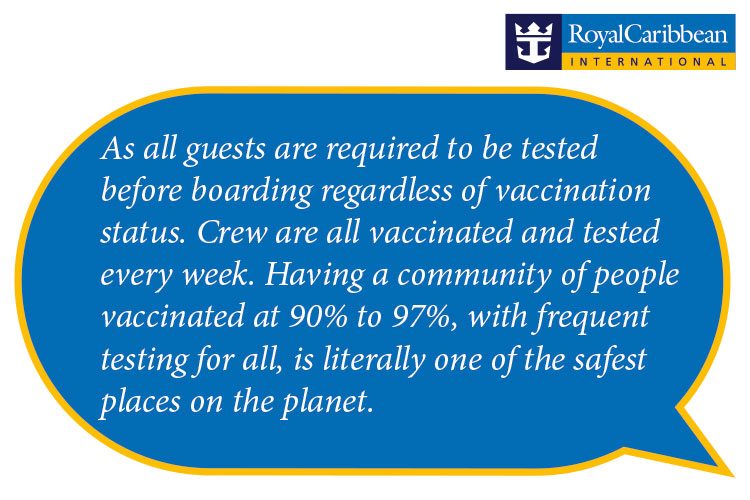
Royal Caribbean’s president and CEO Michael Bayley highlights the importance that vaccination plays in safe cruising since covid-19 hit.
Celebrity Cruises
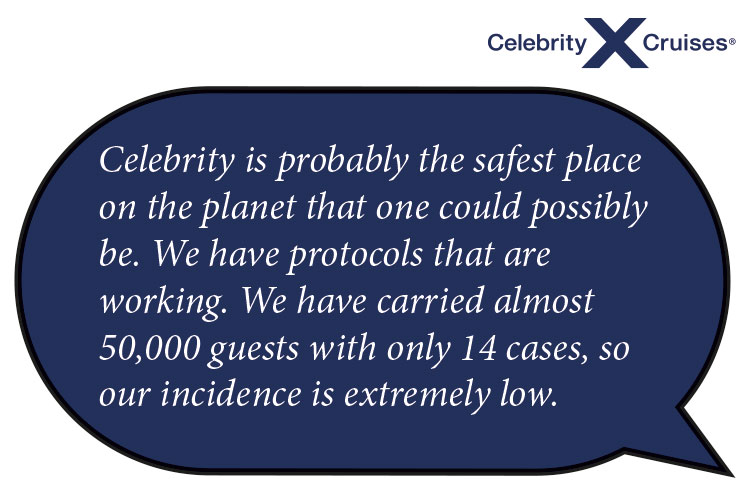
Celebrity Cruises President and CEO, Lisa Lutoff-Perlo thinks that on a cruise ship is one of the safest places to be, and that the new protocols are working.
Princess Cruises
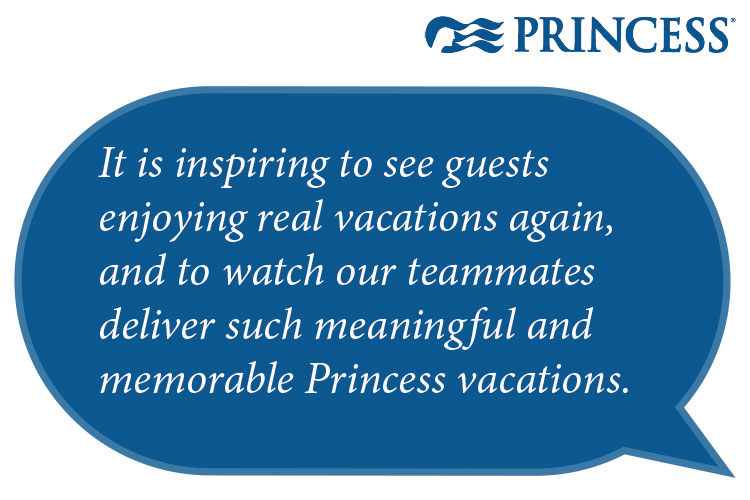
Princess Cruises’ president John Padgett is happy to be back and Princess Proud.
Norwegian Cruise Lines (NCL)
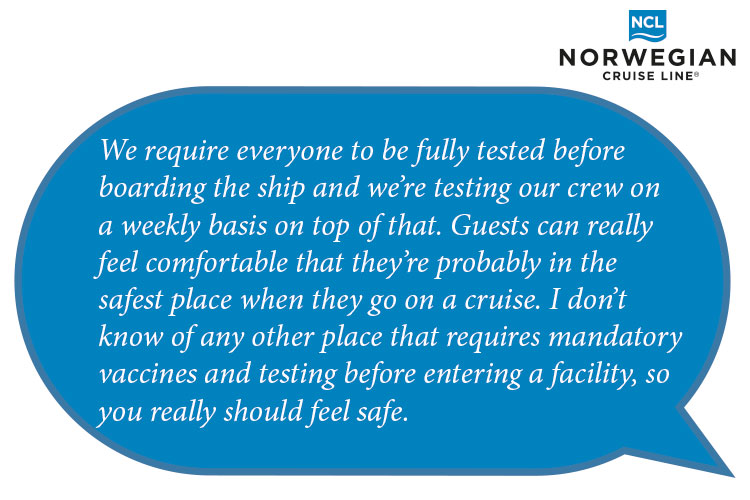
NCL’s president Harry Sommer fully supports full vaccination of all guests and crew to make cruise ships safe.
P&O Cruises
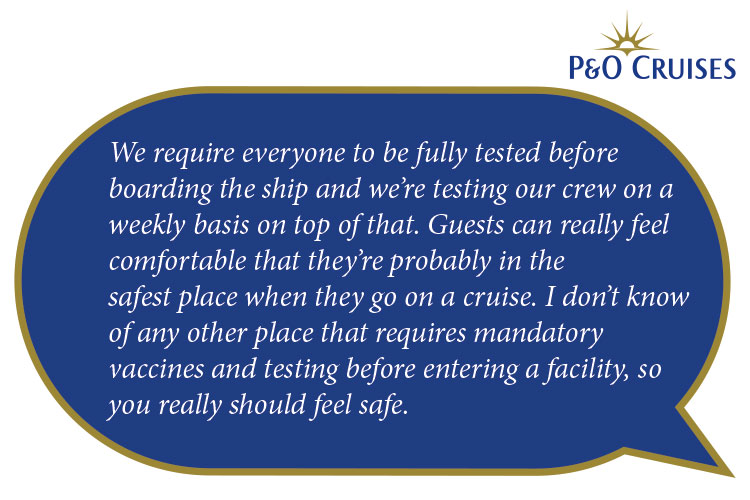
P&O’s president Paul Ludlow comments on how cruising isn’t the only industry that has had to make changes due to covid-19, and that new protocols may seem strict, but they are there to benefit everyone and will feel normal quickly.
Holland America Line
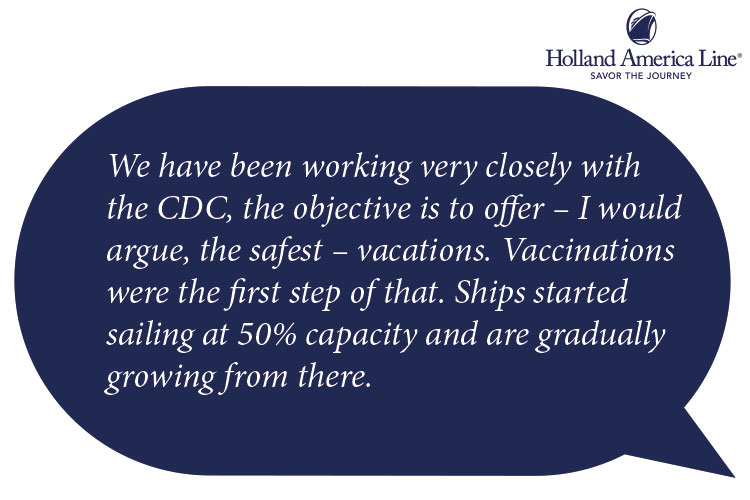
Holland America Line’s president Gus Antorcha highlights taking medical advice and being cautious as the way forward.
Oceania Cruises
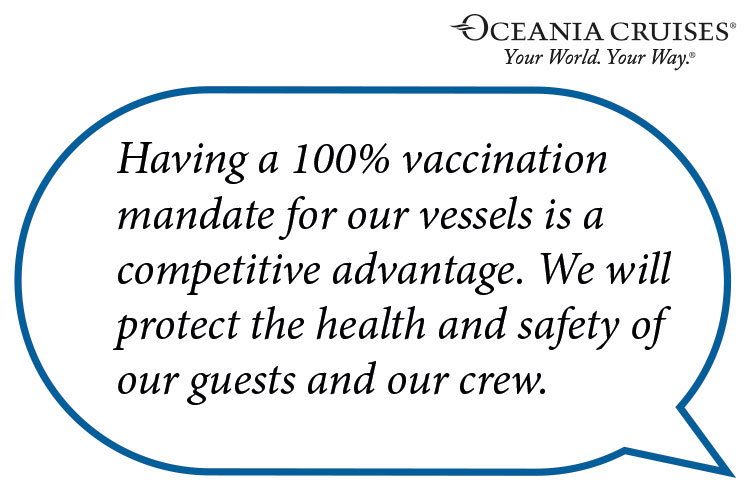
NCLH CEO, Frank Del Rio focuses on the importance of vaccinations and putting health and safety first.
Virgin Voyages
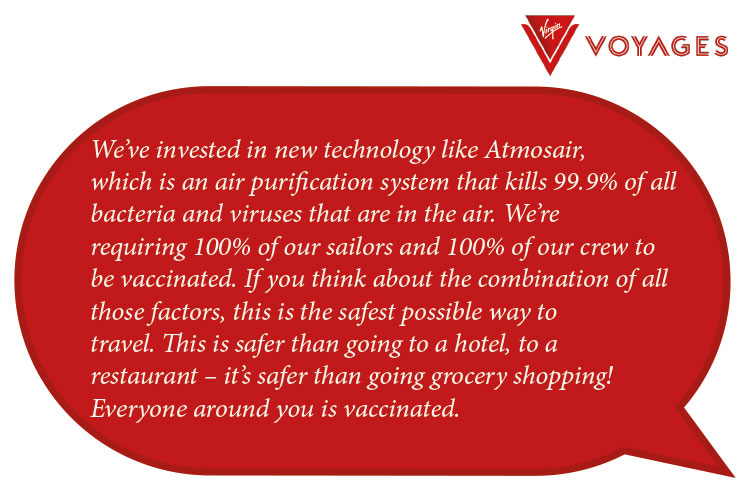
Virgin Voyage’s CEO and president Tom McAlpin discusses their innovative health and safety procedures, using science to make cruising with them safe.
Cruise industry facts from CLIA
Here are 11 facts about things the cruise industry has done to be the safest form of travel. (Source, CLIA)
- The cruise industry has collaborated with global experts, cooperating with national and regional health, transport, and safety authorities to develop world leading health and safety protocols, implementing more than seventy-five science-led measures.
- Ocean-going cruise ships are the only form of travel or passenger transportation that must be medically equipped to care for passengers and crew onboard.
- Cruise ships must have the ability to isolate contagious passengers, and they must have an examination room, an intensive care room and equipment for processing labs, monitoring vital signs, and administering medications.
- Cruise lines help educate cruise passengers on personal health practices, reminding passengers to wash their hands regularly and making hand sanitiser readily available throughout public spaces onboard.
- The cruise industry is one of the most vigilant industries as it relates to sanitation and public health. cruise ships are cleaned and sanitized, under normal circumstances, with a frequency that is nearly unparalleled in other settings. Multiple times each day, cruise ship crews clean and sanitize surfaces known for transmitting germs, such as handrails, door handles, taps and more.
- Cruise industry protocols are unique in their approach to effectively monitor, detect, and respond to potential cases of COVID-19.
- Those protocols encompass the entirety of the cruise experience, incorporating testing, vaccination, screening, sanitation, mask-wearing and other science-backed measures.
- In addition, many cruise lines have announced additional measures in response to the Omicron variant, including strengthening testing, masking, and other requirements, as well as encouraging booster vaccine doses for those eligible.
- Vaccination rates onboard a cruise ship are upwards of 95 percent—significantly higher than the overall UK population, which is currently (as of January 17th, 2022) at around 70% for two doses (76% for one dose, and 53% for three or two plus booster dose).
- Several cruise lines are now requiring, or at least advising guests and crew to have had a booster dose or three doses of covid vaccine by the end of January 2022 to sail (*check your cruise line’s policies for details).
- The latest data shows that, even with higher rates of testing, the cruise industry continues to achieve significantly lower rates of occurrence of COVID-19—33 percent lower than onshore.
A positive look forward from former FDA Commissioner Dr Gottlieb
One of America’s leading public health experts, Dr Scott Gottlieb, former Commissioner of the US Food and Drugs Association, and chair of NCLH SAILSafe programme, gave a special industry talk on his understanding of the covid virus, omicron variant, and how things will move forward from here.
Here are a few of the points he made about the virus:
- Most expert virologists and epidemiologists – including Dr Gottlieb – believe that Omicron will most likely be the last major wave of infection.
- Pandemics have historically lasted between 2-5 years. The last worldwide pandemic was the Spanish flu in 1918. It took longer to spread then as there wasn’t air travel like today to spread it quickly. But there also weren’t the medicines available like we have today to create vaccines to hasten immunity – we are now in the third year of COVID-19, so by this pattern, many experts believe that this should be the final year of COVID-19.
- Many experts believe that 2022 will see it reach endemic phase, where is becomes a manageable issue, like other pathogens such as like other respiratory viruses in the wintertime, like the common cold. The chance is that the prevalence with this will be less than the flu.
- People are feeling more confident as we’ve gathered a lot of immunity in the population. Harder to envision a strain to gain that breakout potential and pierce that immunity. Omicron and delta are likely to remain the main variant.
- We have protections by achieving more widespread immunity from getting COVID-19, and Omicron is a less virulent strain – these two factors intersecting will help.
- Most virologists and epidemiologists believe that there will likely be a very low prevalence of the virus in summer and autumn. This will become more apparent as numbers for cases are reported in the new few weeks.
- To put this into perspective, Dr Gottlieb’s predictions of the Omicron variant rising and falling away does match the UK figures from UK Government Coronavirus data – showing that cases in the UK are now dropping dramatically. The first Omicron case showed in the UK on November 27, when covid-19 cases were 62 per day per 100,000 of the population for the week preceding November 27th. They started rising steeply from December 10th (when they were at 75 per 100,000 population), to the peak of 287 on January 4th, 2022. This has since dropped down to 96 on February 9th (current information at time of publish). If it continues at this rate, Omicron should no longer be a major issue by spring.
- Once the virus is at a sufficiently low level, of 10 or less daily cases per 100,000 of the population, life should go back to pre-pandemic “normal”.
- Countries where they have had less access to vaccines, and countries where there has been very little spread of the virus – and therefore little naturally acquired herd immunity – will take a little longer to reach the endemic stage. However, the UK, Europe and North America should reach this stage first.
Here are some points he made about the cruise industry in relation to COVID-19:
- The cruise industry is held to higher standard than other industries, it must report every single case to authorities – this means that there are more headlines about any cases on-board any ship, than there would be if there were any cases in a resort on land.
- The positive side of this means that cruise lines can tightly control their environment – so cruisers can feel safe knowing that everyone on-board – guests and crew – are fully vaccinated, tested before boarding, following all rules on-board. Crew have stricter rules and are tested regularly.
- Cruise lines have therapeutics available on-board and high-quality, PCR quality testing machines on-board.
- If you’re going on another type of holiday, you’re going to be in unknown settings around other people, where you don’t know the steps that are being taken, or if everyone around you has been vaccinated or tested before arriving. On-board cruise ships everyone tested and vaccinated, and guests have access to therapeutics.
- Cruise lines put health and safety first and in much greater focus than almost any other vacation experience you can take.
Dr Gottlieb will be cruising this summer with his wife and children. He has been very cautious throughout the whole pandemic but is very confident that there will be a lower prevalence of cases by spring.
Overall, cruising is the safest form of travel.
Where else can you go knowing that everyone in the same (floating) building as you has taken a covid test before being allowed to enter? And been double (or triple) vaccinated? Where else does EVERYONE follow the rules to wear masks? Where else do people sanitise and wash their hands as often as on a cruise ship? Where else are all the staff tested as regularly? And where else has as strict cleaning regimens as standard?
Nowhere.
Nowhere rivals cruise for the dutiful level of care, adherence to, and adding to, government and health industry advised policies to keep their guests and crew as safe as possible on cruise ships.
Start your 2022 on a happy note by calling 0808 278 3940 to book your next cruise holiday with Cruise118.com today, feeling safe on-board with the cruise line’s procedures and safe with your booking with our Cruise with Confidence policy. View all 2022, 23 and beyond sailings here!
Happy sailing from all of us at the Cruise118.com team!
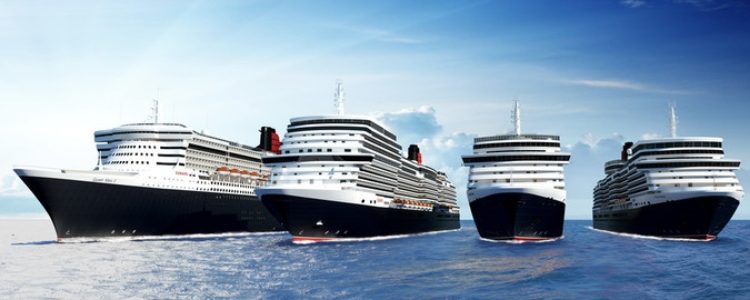
Quite frankly, I absolutely share your position regarding cruising because I see a lot of advantages in this form of travel and I think that it surpasses a lot of others thanks to many distinctive features. It is so cool that you covered this topic in such a detailed way, giving people a clear view of cruising because I think that sometimes people don’t really realize all the benefits that they can gain from this type of travel. It is so wonderful that cruise ships have such a high level of cleanliness and its providing because, from my point of view, it is one of the key factors and it has crucial importance in our current state of affairs. It is so important that cruise lines put health and safety first and pay so much attention to these components. it increases the level of trust in them and gives them a huge edge, advancing them to the forward position.